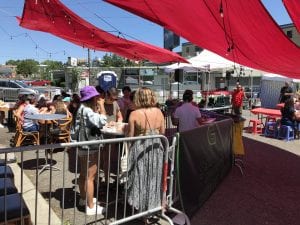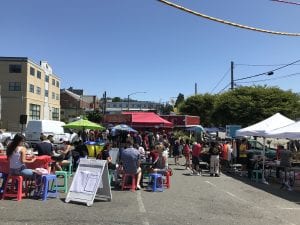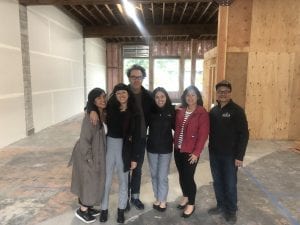Checking In with Friends of Little Saigon
Last September, we presented Friends of Little Saigon (FLS) with the Community Advocacy Award at our annual Preservation Celebration Benefit, recognizing their work preserving and enhancing Little Saigon’s cultural, economic, and historic vitality. For the first time ever, this award included a $3,000 prize which FLS intended to use to help advance their mission by building out and opening the Little Saigon Cultural Gathering Space. Like so many others these days, FLS’s plans have shifted because of the COVID-19 pandemic. Nonetheless, their work to support, strengthen, and preserve culture and community is as robust as ever. We checked in with Valerie Tran, a member of Friends of Little Saigon’s leadership team, for her take on how the pandemic is impacting the Chinatown-International District (CID) community and what FLS is doing in response to those challenges.
One such response has been establishing the CID Restaurants and Other Small Businesses Relief Fund. In late March, a $100,000 seed gift from Vulcan enabled FLS, the Seattle Chinatown-International District Preservation and Development Authority (SCIDpda), and the Chinatown-International District Business Improvement Area (CIDBIA) to come together to provide much-needed financial relief to neighborhood restaurants and small businesses.
“By March, the neighborhood had already suffered effects of the pandemic for a long time,” explained Valerie. “As early as late January/early February, the spread of misinformation and racism had caused many people to feel afraid to visit Asian and Chinese restaurants and businesses.” To date, the emergency relief fund has raised over $300,000 in donations, and over 87 neighborhood restaurants have received critical funding through the program’s first wave of distributions. Currently, 130 non-restaurant businesses are being evaluated for the next wave of distributions, which is expected to take place in May.
 There are many unique challenges in responding to the crisis and managing the relief fund. “Many of our community’s small businesses don’t have a history of engaging with us through mediums like email, websites, and social media,” Valerie said. Interactions in the community more often occur face-to-face, which proves difficult when people are in isolation and businesses are shuttered. “There is also a lot of skepticism because of scams that are targeting small business owners,” she added.
There are many unique challenges in responding to the crisis and managing the relief fund. “Many of our community’s small businesses don’t have a history of engaging with us through mediums like email, websites, and social media,” Valerie said. Interactions in the community more often occur face-to-face, which proves difficult when people are in isolation and businesses are shuttered. “There is also a lot of skepticism because of scams that are targeting small business owners,” she added.
“Language has also been a challenge. In the beginning there was a flurry of information coming from the city, state, and federal governments. Information was coming quickly, but many in the neighborhood were getting the information 4-7 days later because of the time it takes to simplify, translate, and redistribute information. In some cases, we’ve brought information out to the community in hard copy. We’ve been doing a lot of advocacy to the state and city, urging them to provide translated information at the same time that it’s delivered in English,” Valerie noted. “It’s so important to provide consistent information about legitimate sources of assistance in a timely manner.”
 About the role community has in responding to the crisis, Valerie said, “COVID-19 has had some positive effects in the way the community has come together to respond. Throughout history, Asian American and Pacific Islander groups have been pitted against each other. This leads to finger pointing and debate over which ethnic group is more oppressed. Now people are coming together, people are stepping up, and community groups are partnering like never before to provide financial relief, wellness checks, groceries, and meals to people in need. We’ve got to be in this together.”
About the role community has in responding to the crisis, Valerie said, “COVID-19 has had some positive effects in the way the community has come together to respond. Throughout history, Asian American and Pacific Islander groups have been pitted against each other. This leads to finger pointing and debate over which ethnic group is more oppressed. Now people are coming together, people are stepping up, and community groups are partnering like never before to provide financial relief, wellness checks, groceries, and meals to people in need. We’ve got to be in this together.”
In addition to her role as Operations Director at FLS, Valerie Tran previously served on the boards of FLS and the International Special Review District. She also currently serves on Historic Seattle’s Council and understands the value of preservation. “This COVID-19 response work is important for cultural preservation. If these businesses and cultural institutions can’t reopen, this will be a huge loss to the cultural fabric of the city and the communities that rely on them,” she said. “This is why this work is critical. We can sometimes take our cultural businesses and places for granted, but the crisis brings to light the importance of community preservation, and that our work must go beyond physical and architectural preservation.”

Valerie Tran (second from the left) with members of Friends of Little Saigon
While the opening of the Little Saigon Cultural Gathering Space is delayed as a result of the recent construction moratorium, space has been leased and will include a small business resource center, office space, a Vietnamese café, a library, and an art exhibit space. Earlier this year, FLS launched a call to artists and selections were made for what will be the art space’s inaugural exhibit. “Owning It” will feature several visual and 3D artworks by Vietnamese American artists.
It has been just three years since Friends of Little Saigon brought on its first paid staff member, executive director Quynh Pham. Prior to her arrival, FLS had been an all-volunteer group since its founding in 2011. “The progress that has been made toward our mission is a testament to Quynh’s ability to implement the volunteer board’s vision,” said Valerie. Historic Seattle joins Valerie in commending her colleague and the ongoing achievements of FLS.